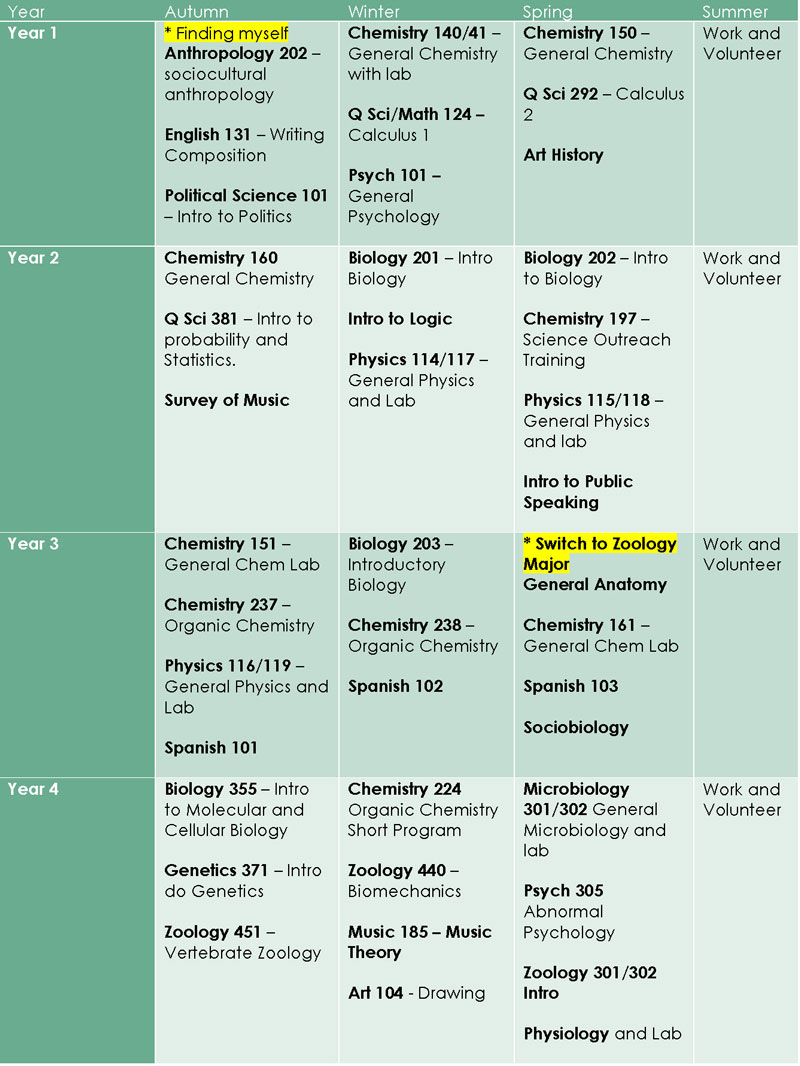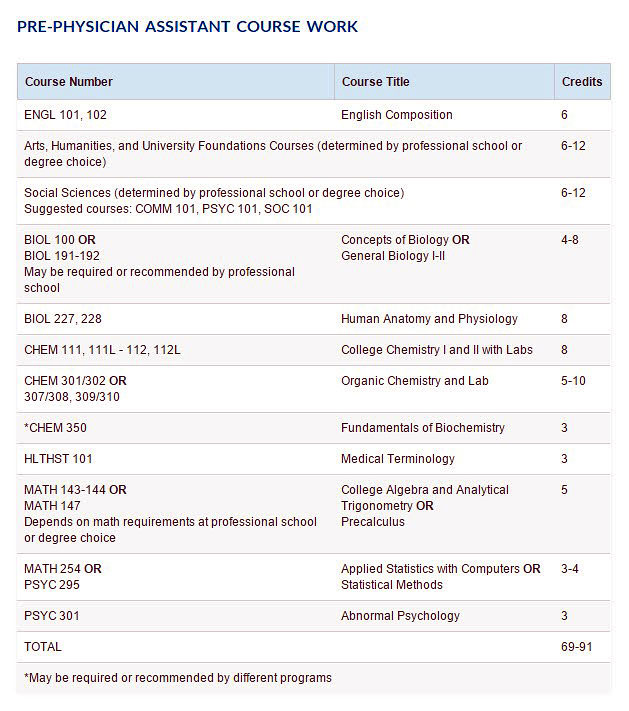
* To compare top ranking PA schools and download your FREE PA School Prerequisite Worksheet click here
This post is part of my 5 steps to PA school series to go from zero to PA school hero:
- Complete the necessary prerequisite coursework
- Obtain the required medical and hands-on patient care experience
- Successfully prepare for and take the GRE (or avoid it)
- Obtain at least 3 High-Quality Letters of Recommendation
- Complete the CASPA application Essay and all additional supplemental materials on time.
Today we are going to tackle STEP 1:
Identifying and Completing the Necessary Prerequisite Coursework
Is there a Perfect Undergraduate Course Curriculum to Get into PA School?
Upper division prerequisite requirements can be completed at a four-year institution, community college, or online courses from regionally accredited institutions. We do not look down on community college coursework. It will be factored in the same way - Penn State PA ProgramClick To TweetIf you are serious about PA school these are just some of the questions you should be asking yourself:
- What courses, if any, are considered standard prerequisite course requirements across many different PA schools?
- What schools do I want to apply to? Do they have special prerequisite course requirements in addition to the standard prerequisites I identified above?
- What courses should I take that go above and beyond the required prerequisites that will help me to stand out to the PA school admissions committee?
- What major should I choose that would allow me to complete all my prerequisite coursework and still have a career if I do not get into PA school or change my mind later?
Designing the Perfect Pre-PA School Course Curriculum to Get into any PA School
Let's start with the basics.
Prerequisite course requirements vary from school to school. That being said, there is a general curriculum that most PA schools require before matriculation.
Most programs will require at least:
- One year of chemistry with labs*
- One course each of human anatomy and physiology with labs
- One course in microbiology with lab
- One course in statistics
- One course in psychology
*Schools can be very particular about which chemistry series they prefer. It is important to consult websites of schools you are interested in, and then check with your academic adviser.
Other frequently required or recommended courses:
- general biology
- genetics
- organic chemistry
- biochemistry
- additional courses in social/behavioral sciences
- languages (some schools require coursework in Spanish)
- medical terminology
- public speaking
My Undergraduate Pre-Physician Assistant Prerequisite Coursework
No more than two prerequisite courses can be outstanding at the time of application and they need to be done by the fall of the application year. - Case Western Reserve PA ProgramClick To TweetAs a real-world example, I am going to show you my 4-year undergraduate course schedule at The University of Washington.
I was following a pre-medical track through the spring semester of my junior year. It was at this point that I spoke with an academic adviser about my career choice to be a Physician Assistant and changed majors (You will see this highlighted in yellow below).
I declared my new major in Zoology with a renewed focus on completing my pre-PA coursework. Leaving the pre-medical track opened up many options I had not previously had. I was now able to take courses in genetics, physiology, biomechanics, and microbiology, among other courses, that both increased my GPA and strengthened my PA school application.
My PRE-PA prerequisite coursework
- Anatomy and Physiology
- Upper-level Biology - 1 year
- Cellular Biology elective
- Microbiology with lab
- Upper-Level General Chemistry with lab – 1 year (3 quarters)
- Upper-Level Organic Chemistry 2 quarters with a change to the short program my senior year.
- Upper-Level Physics with lab – 3 Quarters
- Genetics
- Math - Qualitative Science" Calculus – 2 quarters with 1 quarter of statistics
- Sociobiology
- Biomechanics
- Foreign Language - 1 year
- General and Abnormal Psychology
- English Composition
Here is a detailed breakdown of my 4 years at the University of Washington (based on a quarter system)
* Finding myself: During my first quarter at the University of Washington, I joined a freshmen interest group (F.I.G) with a liberal arts focus. I had hoped to join a "FIG" focused on pre-medical sciences but, in my typical "procrastinator" fashion, I signed up too late. I spent my first quarter in college with a group of wonderful students and soon to be close friends. Although I knew I was going to pursue a degree in medicine from the start, this first quarter was not a wash. It gave me a strong supportive community of like-minded individuals and taught me that there was a world beyond the hard sciences. I then started winter quarter of my freshman year ready to tackle my medical prerequisites.
What courses are a "standard prerequisite" across many PA schools that I should take to increase my options come application time?
The goal of your undergraduate education in preparation for PA school is simple:
- Complete the necessary prerequisite coursework required to pursue your advanced degree as a Physician Assistant.
- Enjoy the process of learning.
- Avoid wasting time (and money) on courses that are unnecessary, that do not contribute directly to your primary objective or worse; prolong the time required to obtain your undergraduate degree (which will cost both time and money).
Although all PA schools have varying prerequisite coursework requirements, a systematic look into prerequisite requirements across many PA schools will reveal patterns that will help guide you.
The following table compares prerequisite course requirements from 10 different top ranking PA schools in the United States.
The 9 subjects highlighted in yellow represent common core requirements that you should pay attention to.
Overview of Physician Assistant Prerequisite Course Requirements by School (10 Top Ranking PA Schools)
Unless you are superhuman you must click on the image to view in full size or just (click here)
Key: U = Upper Level Course L = Lower Level Course X = General requirement
What courses can I take that go above and beyond the required prerequisites that will help me to stand out as an applicant?
When surveyed PA program programs value student acquisition of knowledge, skills, and attitudes needed to be a PA. Other themes include the capacity of students to graduate and become employed, valuing diversity and cultural differences, a comprehensive and strong curriculum, as well as alumni who are self-directed, lifelong learners.Click To TweetIn the above table, you will notice there are lots of boxes marked "L" for "lower-level".
You may be thinking "great, that makes my life easy"!
But stop for a minute and look at George Washington University, which requires all "Upper Level" coursework.
I could spend the next 20 minutes giving you reasons why you should avoid the low-lying fruit, but I think you can probably figure this out for yourself.
The difference between Upper and Lower Level Courses:
Let's use one of my least favorite subjects, chemistry, as an example.
At the University of Washington (UW), the Chemistry department offers Chem 110 and Chem 120: Introduction to General Chemistry and Principles of Chemistry 1. At UW this would constitute "lower level" general chemistry.
If you were to take a look at the University course catalog you will see that there is another step above Chem 110 and Chem 120: General Chem 142, 152 and 162. This is a more advanced, 1-year general chemistry series with a lab component. It is required by pre-medical students and recommended for science and engineering majors. This is the general chemistry I would recommend all serious PA school candidates take.
The same holds true for organic chemistry. In the course catalog, you will see Principles of Chemistry 2 and 3, Chem 220 and 220 - these are "lower level" courses. I would suggest Chemistry 237-239 which are upper level.
There is lower level Biology 100 and a more advanced upper-level Biology 200 series.
Do you see a pattern? You will find this across most, if not all, course offerings at all major Universities and Community Colleges.
Not convinced? Here is just one example of why you should consider upper-level courses:
My wife, who was pre-nursing, took all "lower level" science courses as a pre-nursing requirement. This was based on recommendations made by her academic adviser with a pre-nursing focus. When it came time to apply to the UW School of Nursing (the number one nursing school in the country at the time) she was surprised to discover that her prerequisite coursework paled in comparison to many of her colleagues who had chosen all upper-level science courses. To her boyfriend's dismay :-), she was not admitted into the UW School of Nursing and had to apply elsewhere. On a happy note, she was accepted to Seattle Pacific University's School of Nursing later that year!
If you do not, like my wife, you may regret it later!
Sample University Program Pre-PA Curriculum
We will accept humanities credits that are older than 5 years. Science credits must be taken within 5 years of applying. - Toro University PA ProgramClick To TweetThe following is a sample from Boise State Universities designated Pre-PA School Program curriculum.
With the growth of the PA profession, there are now many Universities offering a focused Pre-PA School Program with a targeted curriculum designed to help you get into PA school.
You may find that the Universities offering such programs often have their own PA programs and will design their curriculum around their own PA program requirements.
That being said, I have found most of these programs to be well thought out and provide the majority of the prerequisite coursework required by PA schools nationwide.
What Major Should I Choose to Get into PA School?
The last question I will touch on briefly today is the question of picking your college Major.
PA schools are flexible in the choice of undergraduate major.
Like medical schools, they care that you do well in your major (as well as your prerequisite courses) and that it reflects your interests.
I have counseled students from all different academic backgrounds and majors. Everything from dance to the more common biochemistry.
If you have certain areas of academic weakness that is OK, as long as your performance reflects an upward trajectory and a passion for the profession.
When choosing a major, it is wise to also think about alternate future careers in the event that you change your mind, or are not admitted to a PA school.
It is also wise to consider a major that may help you obtain the necessary medical experience upon graduation in preparation to apply to PA school.
Common choices for obtaining medical experience often do not require a college degree. To work as a phlebotomist as I did, an EMT or a CNA, for example, will require additional certification only. Alternatively, one could pursue a 4-year degree in nursing as an undergraduate, obtain the necessary PA school prerequisites prior to graduation, use this degree to work intensively in the field for 4-5 years gaining valuable medical experience and then apply to PA school.
OK, that is a lot of information but what is the perfect Pre-PA curriculum?
Hopefully, after reading this post you have a much better idea of how to approach your undergraduate studies. To design the perfect curriculum I have created a worksheet to help you accomplish this goal.
Here are some steps to consider:
- Make a list of the top 10 to 15 schools you would consider applying to. Go to the PAEA Program directory (which is now FREE Yeah!) and look up each school. Use the worksheet provided below to make a table of the required courses. Take special note of any "outliers" and decide if these courses are absolutely necessary to meet your application goals and if so, what are you going to do to address these prerequisites? Don't put this off until later! What if you aren't sure what PA schools you want to apply to? Start with a geographical preference and work from there. Even if you have a list of 15 random schools this will give you a good idea of what requirements you will need to satisfy.
- Where are you right now? This is going to help you build a timeline to complete the necessary prerequisite coursework. Take your worksheet and meet with an academic adviser at your University or the local Community College who can help you design a course curriculum that will meet your needs.
- Take upper-level courses. You can take the easy road and meet the minimum requirements, but I would avoid this if you can. From my own experience, and as you can see from the chart I created above, upper-level courses will not only give you more options come application time but will also make you much more competitive as an applicant.
- Focus on your education: You need to make your academic coursework your top priority. If you are going to work while attending school pay careful attention to how it is affecting your academics. In my case, working part-time at the campus health center 2 hours a day, helped me focus and improved my academic performance. But this is not always the case. If you are a returning student, have a part-time or full-time job or if you are a parent, make sure to schedule time for your studies and make sure everyone else is on board.
The PRE-PA Prerequisite Worksheet
Click here to download your FREE PA Prerequisite Worksheet.
I will be back shortly to discuss number two: Obtaining the required medical and hands-on patient care experience, so stay tuned!
- Stephen Pasquini PA-C
View all posts in this series
- How to Write the Perfect Physician Assistant School Application Essay
- Prerequisite Coursework: How to Design the Perfect Pre-PA School Curriculum
- Healthcare Experience Required for PA School: The Ultimate Guide
- Secrets of Successful PA School Letters of Recommendation
- The GRE and PA School: The Pre-PA Advisor Series


















Do I need physics in order to be ready to go for PA school?
You will have to check with the school(s) to which you are applying. Prerequisites are particular to each program.
Hello Stephen
How are you . I have a bachelor’s degree in liberal study health track . How can I apply for PA school in Florida is not easy to get into the PA program.
Hi Mirlande! Here are the 8 steps that apply to everyone: https://www.thepalife.com/how-to-become-a-physician-assistant-in-8-simple-steps/
Hi! This is a very helpful post for me as a pre-PA. I was just wondering, could I major in computer science and still get into PA school (given that I complete all the prerequisite classes as well)? Also, is it possible to complete a major and minor (for example computer science major, stats/math minor) and still be able to complete the PA school prerequisites in 4 years? Thanks!
Hello! The short answer is yes, and yes. In fact, with a plethora of biochemistry majors applying to PA school having a major such as computer science can help you stand out from the crowd. Just make sure you start researching PA programs early and create a spreadsheet of PA school requirements you need to satisfy. Get those HCE/PCE hours while you are at it. It’s never too early to start and put on your volunteerism hat. Get some shadowing hours along the way – I recommend you try to have at least 8 hours.
Stephen
Hi Stephen.. thanks for putting together this post. SO much good info! Any chance you (or anywhere on your site) can filter by timeline for completed prerequisite coursework and PA program application? ..thanks!
Hi Isaac, thanks for the kind words! Can you tell me a little more about what it is you are looking for. Is it to filter prerequisite requirements by schools? Or are you talking more about an undergraduate timeline? If you give me a bit more detail I will see what I can do.
Stephen
Hey,
Does Human development course DEP 2004 at IRSC qualify as a psychology course? Please let me know.
Hello! My name is Victoria and I am in the process of finalizing my application for UW right now so I am quite content to see that you have a connection there. My intended major is Health Studies at UW Bothell Campus. I was wondering if this would be a good major to be in? I want to somehow combine my interests of sociology and biology together so I think this major is perfect for me. If the major doesn’t really have classes that overlap with the PA school prereqs, should I minor in something science-related to meet those requirements more easily? (while earning a minor too) Thank you so so much. I really need some help in finalizing the decision and would love a second opinion. Hope to hear back from you soon!
Hi Victoria, if you haven’t already I would recommend making an appointment with one of the UW college advisors ASAP. I know for myself personally, I never would have found Zoology as a major had it not been for a very smart college advisor who was able to take the puzzle pieces and make them all fit. The answer is always yes, you can make it work, but the real question here is about blending time, your enjoyment of the coursework, tuition, and prerequisite requirements into the caldron of college course offerings and pulling out the best option. There will be many options but speaking to somebody who is familiar with all of the options available to you will be your best bet. Then you can weigh the options and make the best choice for your goals.
Warmly,
Stephen Pasquini PA-C
http://www.smartypance.com
http://www.thepalife.com
Hey Stephen!
I graduated undergrad about 5 years ago and I am planning on applying to PA school next cycle (+1 year). Will I have to retake the prerequisites I took my first year of college as those will be outside the 7 year limit most schools require? I majored in Biochemistry so I took upper level courses after my first year as well.
Thank you for your time and amazing content !
Thank you for this page. It is very helpful. I have been considering PA school for almost 8 years now. The cost was a definite obstacle. My BA is not exactly medical or scientific, but I have been a nurse for 4 years now and have experience in the field (working and clinicals). I would need to take a year of the science classes (didn’t take them for my BA), and then apply to the PA schools. Should where you want to work and live factor in to your choosing a school? Is it a bad idea to actually email the chairs and advisors of the school you want to attend to find out if you can substitute coursework or how to get chosen for acceptance?
Secondly, is it a bad idea to speak with PAs and Physicians and shadow them?
It’s imperative that you speak with PAs and physicians and shadow them. Just make sure, if you are applying to PA school your shadowing experiences is weighted correctly. I.E. if you do 100 hours of shadowing you will want 70% or more of that shadowing to be PA shadowing. Otherwise, the ADCOM’s will wonder why you spent all your time shadowing doctors when you really want to be a PA!
Stephen
Where you work and live should only factor into a choice if it is a factor in your choice. Otherwise, if you are able to relocate you can cast a wider net. As far as emailing chairs and advisors it’s perfectly fine and I encourage this! The information on the websites is often very limited so make sure you have all your questions answered. You don’t want any surprises!
Stephen
I think it is also important to stress that students on the west coast who wish to apply to PA programs should also try to attend a college on semesters.
I attended a university on the quarter system, and while I completed all prerequisite classes, I could only apply to 3 of my 18 PA programs. This is due to the fact that my 4 credit microbiology, statistics, genetics, biochemistry, and many more, did not count towards the required 3 semester credits needed to fulfill the prerequisites at most of the PA programs.
I was just 0.33 semester of credits short for each of these subjects at almost all programs outside the West Coast.
I contacted more that 25 programs to ask if they could make an exception, however, they typically will tell you to take another college course. This is something that needs to change in PA program admissions, as it is a huge disadvantage to students at colleges on the quarter system. While students at semester colleges have to take one class to fulfill various prerequisites, students at quarter credit universities have to take an average of 2 classes, making graduation in 4 years impossible.
Until PA programs start making exceptions to the conversion between quarter to semester credits, DO NOT go to a university on quarters. It is not worth it.
I am currently in grad school. However, I have never taken statistics in undergrad but i have taken pre-calc and calculus. Is it possible to substitute the statistics requirement with these courses?Or would I have to take an online stats course before submitting my application?
I went back to school later in life, I am currently 54. I received my Bachelors in Psychology at the University of Wisconsin-Milwaukee May of 2017. I moved to Washington state 2yrs ago and am interested in the PA program. I wondered what you could or would recommend for me as a possible path to entering and completing a PA program.
Hi James, as a mature student you stand a better than average chance of being accepted into a program on your first attempt. Most schools weight this experience highly especially schools like OHSU or The University of Washington Medex program. If you still need a couple of prerequisite courses you can complete these either at UW or Washington State University or one of the various CC spread throughout the state, or through an extension program. Once you have completed these courses, make sure you have the required shadowing and patient care experience hours then throw your hat into the mix. Being an outlier is a good thing, especially when it comes to competitive PA school admissions.
Stephen
I am foreign md and I want to get pa certification. which prerequisites should I take? I really need a consular. could you pleas help me with that?
HI Shafieh, please message me through my contact form and we can set up a time to talk, I am happy to help in any way I can.
Stephen
Very helpful information. I currently work as an Certified Nurses Assistant. And currently am a returning student at a local community college here in the state of G A, I’m just wondering can I start taking these upper courses now while I’m in school?? There are several medical fields that I’m interested in PA is one of them. The other 2 are as followed: 2) Nurse anasthelogist.or(assistant) 3) Nurse practioner. I’ve been working as a CNA for over 25+ years now, and would like to go further in the medical field. Any suggestions/advise/help???
Hey Stephen! This is a great resource for people wanting to pursue a career as a PA. Great read! I was curious about information as to when this article was published, because I would love to cite this for a project I am doing. Thank you for your time!